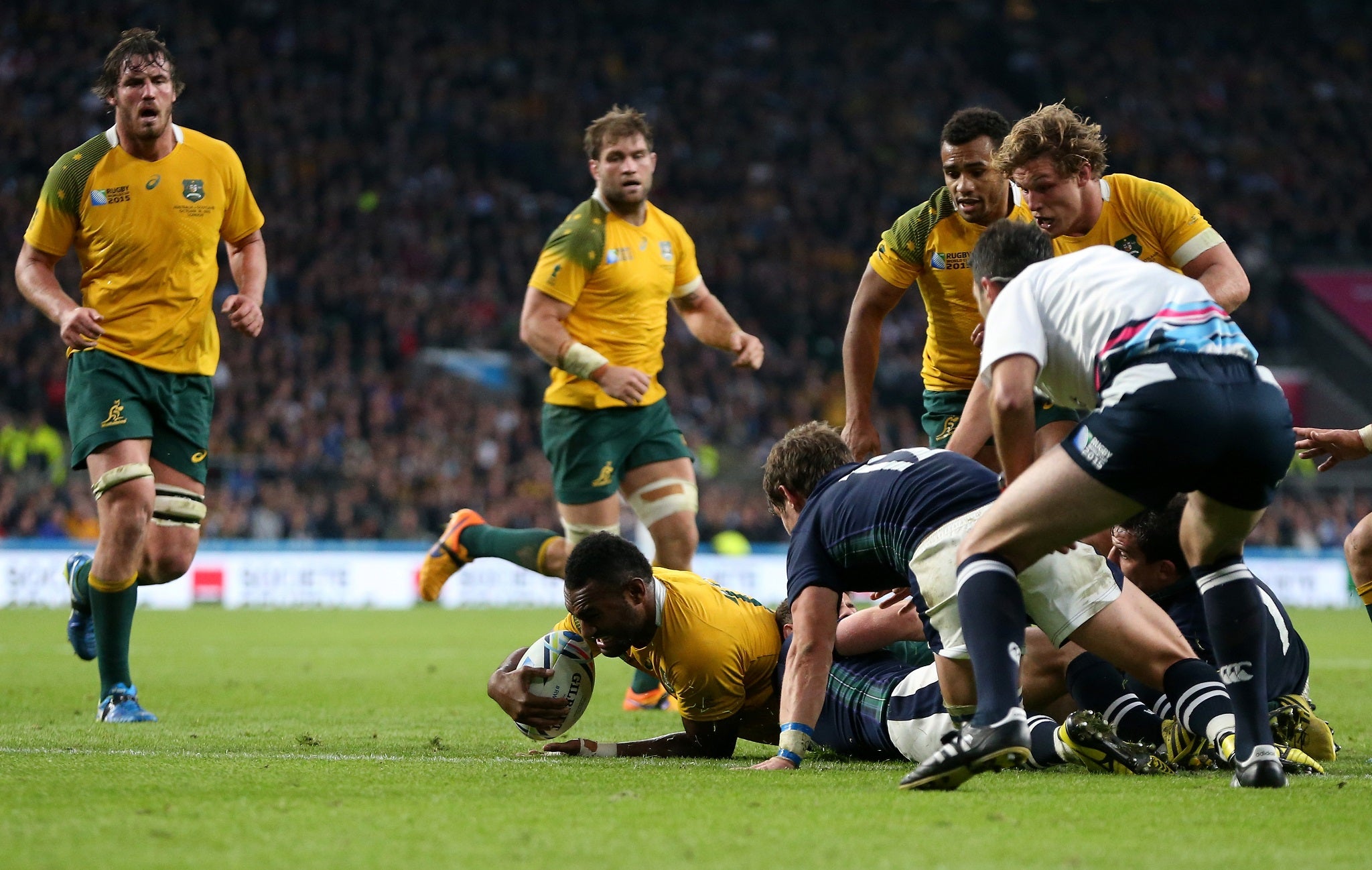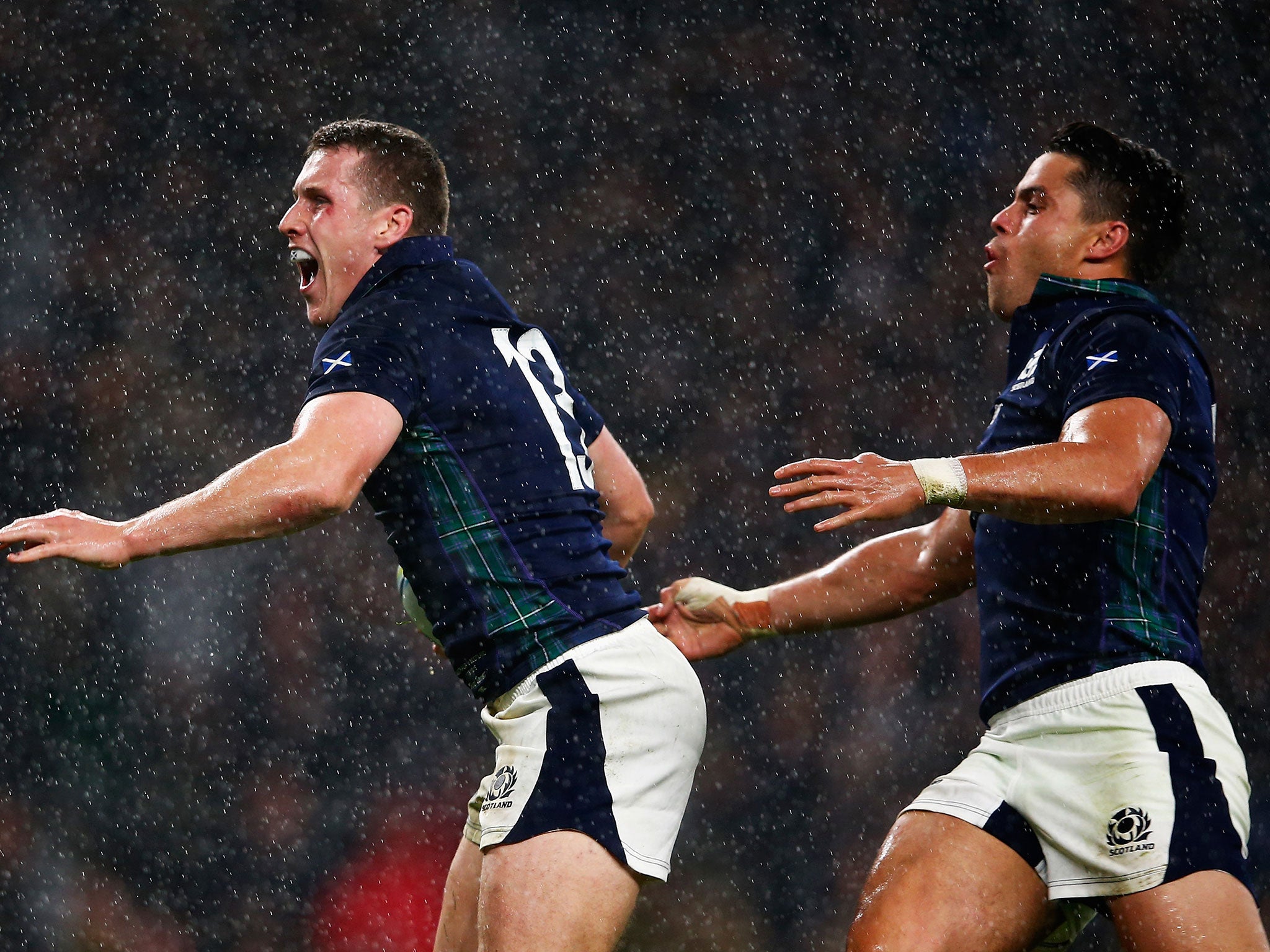Australia vs Scotland match report: Scots suffer heartbreaking last-minute defeat after controversial penalty
Australia 35 Scotland 34

Your support helps us to tell the story
From reproductive rights to climate change to Big Tech, The Independent is on the ground when the story is developing. Whether it's investigating the financials of Elon Musk's pro-Trump PAC or producing our latest documentary, 'The A Word', which shines a light on the American women fighting for reproductive rights, we know how important it is to parse out the facts from the messaging.
At such a critical moment in US history, we need reporters on the ground. Your donation allows us to keep sending journalists to speak to both sides of the story.
The Independent is trusted by Americans across the entire political spectrum. And unlike many other quality news outlets, we choose not to lock Americans out of our reporting and analysis with paywalls. We believe quality journalism should be available to everyone, paid for by those who can afford it.
Your support makes all the difference.This is the way the World Cup ends for the northern hemisphere: not with a whimper, but a bang… closely followed by a howl of anguish every bit as deafening. Scotland, the European side considered least likely to find a way into next weekend’s semi-finals, summoned the furies of hell and brought them down on the heads of the Wallabies yesterday, only to fall to a profoundly questionable penalty decision in the dying seconds.
Craig Joubert, the South African referee widely accused of costing France a first global title in Auckland four years ago, may or may not have seen the crucial incident correctly, but by sprinting off the field at the speed of sound the moment the game ended, he betrayed the best traditions of a sport that holds these things dear and left himself open to the most ferocious criticism. If Nicola Sturgeon was given what might euphemistically be called a mixed reception from the 78,000-strong crowd, the send-off afforded Joubert was all of a piece.
In one sense, the Scots had only themselves to blame for the denouement: their line-out, not quite secure enough for much of the game, went wrong once again in a hazardous position deep in their own half, the otherwise excellent No 8 David Denton palming back loose ball that gave the Australia forwards one last shot at salvation. But from that point on, the rugby gods gave them the most savage of goings-over.
John Hardie, the Scotland flanker recently arrived from New Zealand, touched the ball in the air, but it also ricocheted off the Wallaby scrum-half Nick Phipps. So was Hardie’s colleague, the substitute prop Jon Welsh, in an offside position when he gathered the rebound? The debates in a thousand pubs up and down the land continued long into the night, but as Greig Laidlaw, the blue-shirted captain, said through gritted teeth in the immediate aftermath: “They go upstairs to the Television Match Official for everything else these days, so why not do it for something that important?”
Needless to say, the Australia outside-half Bernard Foley rediscovered his mental fortitude and recalibrated his marksman’s radar just in time to nail the 26-metre kick with 42 seconds left on the clock, thereby giving his side a winning one-point lead. At no point previously had he seemed capable of hitting a cow’s behind with a banjo. As confirmation that Sod’s Law exists, it was utterly conclusive.
There were other controversies: enough to sink the proverbial battleship. Did Sean Maitland, the Scotland wing, really deserve 10 minutes in the cooler for a deliberate knock-on early in the second half? It was certainly a major call by Joubert, for within seconds of Maitland’s departure, Drew Mitchell claimed a try down the vacant channel.
Should Joubert have yellow-carded Will Genia for naked gamesmanship after the Australian half-back chucked a pass straight at Mark Bennett as the Glasgow centre lay prone on the deck? He might have done. Instead, he made an offside call against the flabbergasted Bennett and allowed Foley to open up a 25-19 lead from the tee. On such calls are quarter-finals decided…and hearts broken.
Yet for all the whys and wherefores, the marginal calls and grey areas and apparent injustices, this much is indisputable: the contest was utterly captivating. The Wallabies looked positively lethal in open field, especially when Kurtley Beale was ransacking his rugby imagination for new ways of attacking, and they were good value for the five contrasting tries they accumulated. But there was a heroic flipside to all that Wallaby flamboyance and it came in the shape of a passionate Scottish uprising.
They went after the Australians in the scrum – W P Nel, the South African import on the tight-head side, made Scott Sio’s life a misery at the set-piece – and with the industrious Hardie at his busiest in the loose, not even a breakdown specialist as brilliant as Michael Hooper could establish superiority.
What was more, the Scots scored three tries of their own: quite a return for a side who, for far too long, have seemed impotent with ball in hand. The centre Peter Horne claimed the first on 17 minutes, spotting a gap between Sio and Rob Simmons and slipping over from a close-range ruck with all the brass neck in the world. The second fell to the wing Tommy Seymour, fed inspirationally off the floor by Finn Russell after Foley’s attempted clearance had been charged down.
And if the last was hardly a classic of creativity, the Wallabies could not feel hard done by. With seven minutes left on the clock and Scotland trailing 32-27, Denton worked wonders to rescue scruffy possession off the base of a scrum and launch another attack. Up went the ball, and when it descended, it fell into the arms of the Australia prop James Slipper, who promptly threw a dummy to no one in particular before lobbing the softest of interception passes to Bennett. Just for a while, the whole of Scotland believed.

Their faith was not repaid, partly because of ill fortune and partly because the Scots were not sufficiently precise with their exit work when the pressure came on, as it was bound to do. Perhaps this is the crucial difference between the best of the best on either side of the Equator: it is hard to imagine the Wallabies, the All Blacks, the Springboks or, indeed, the Pumas, giving the opposition one last chance in so chaotic a manner.
European rugby has been too familiar with failure for far too long, but at least this was a failure of the glorious kind. Cold comfort for a team from a cold country? For sure. But for 80 minutes yesterday afternoon, a Six Nations side showed the very best of itself…and for three or four of those minutes, they could have been forgiven for thinking that the best might be enough.
Join our commenting forum
Join thought-provoking conversations, follow other Independent readers and see their replies
Comments